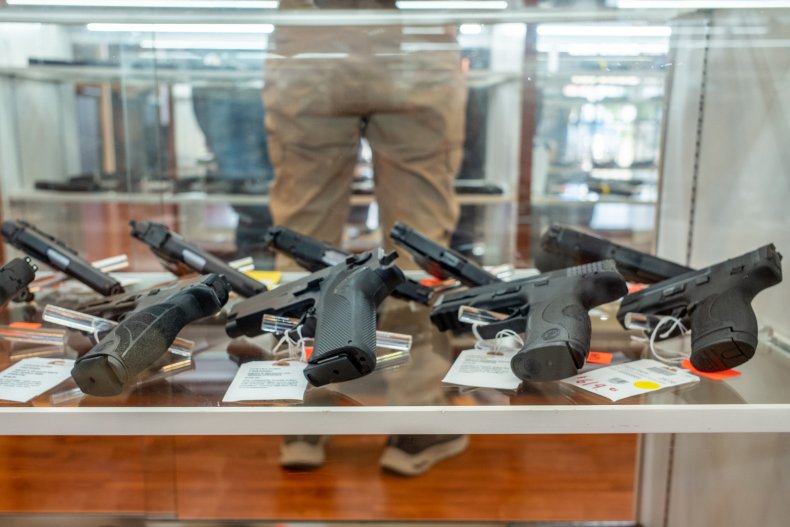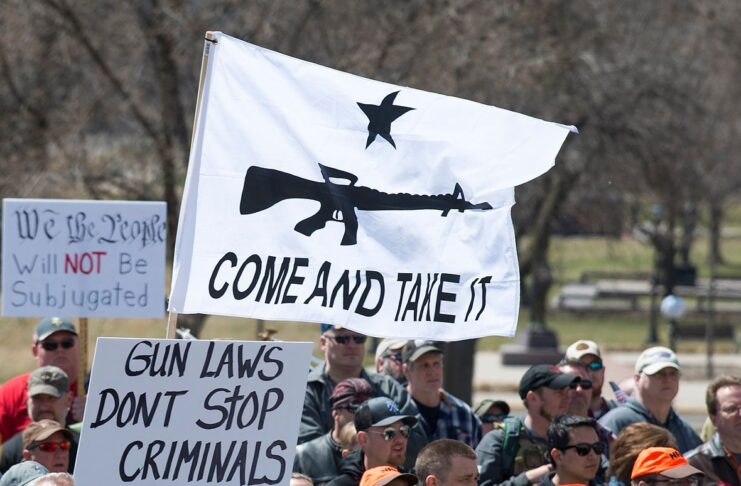A frequent talking point in the gun control debate is that Americans overwhelmingly support “common sense” gun control measures, such as universal background checks and red flag laws. The Biden administration referenced these surveys last month, when it announced that $231 million will go to states that enact “red flag” laws and push gun control policies. These surveys are constantly invoked in legislative hearings and in the media. But surveys often compress complicated bills down to one-sentence summaries, and the results are often unreliable.
Gun control advocates claim that over 90% of Americans support universal background checks, which would require checks for privately exchanged firearms. Fact-checkers from Politifact and Snopes support these claims. When asked why Congress won't pass a universal background check law, academics point to the lobbying power of the National Rifle Association.
But in 2016, despite billionaire Michael Bloomberg‘s overwhelming financial backing, ballot initiatives for universal background checks failed in Maine by 4% and won in Nevada by less than 1%. In both Maine and Nevada, the background check initiatives had far more financial support, and the media was overwhelmingly sympathetic to the cause.
If the surveys conducted by gun control advocates were accurate, these should have been easy wins. But surveys often ask very simple questions such as, “Do you support or oppose requiring background checks on all gun sales or transfers?” The actual laws in question, however, can run for dozens of pages and are far more complicated than one-sentence summaries imply.
To examine this, the Crime Prevention Research Center (CPRC), which one of us heads, hired McLaughlin & Associates to survey 1,000 likely voters from February 17 to 22. When asked if they support background checks on all gun sales or transfers, likely voters expressed support for such a law by a whopping 86%-11% margin. Those who strongly supported the policy outnumbered those who strongly oppose, 70%-5%. All incomes, education levels, and demographics expressed support for such a law.
Two follow-up questions were then asked.
First: “These laws are called universal background checks. Let's say a stalker is threatening a female friend of yours late on a Saturday night. She asks you if she can borrow your handgun until she has a chance to buy one. She is trained and has no criminal record. If you loaned her the gun, this law would make you a felon. Would you support or oppose this law?”
Respondents now opposed these background checks by a 44%-42% margin. While Democrats, liberals, singles, those living in urban areas, and blacks still strongly supported these laws, Republicans, moderates, married people, those living in non-urban areas, and whites opposed them.
Second: “A Boy Scout troop is going for his skeet shooting badges. If you lend the Scout master your shotguns, you would be committing a felony. Would you support or oppose this law?”
Voters now opposed the policy by a 45%-42% margin, with a similar demographic breakdown.
Surveys on “red flag” laws contain the same sort of oversimplification. These surveys typically ask people if they support laws that “allow guns to be temporarily confiscated by a judge from people considered by a judge to be a danger to themselves or others.” That seems reasonable, and Americans support such a law by somewhere between 2-1 and 3-1 margins. But all 50 states already have involuntary commitment laws that do exactly that. Surveys fail to explain how “red flag” laws will change the current law and bypass normal legal and judicial processes whereby complaints are made and witnesses are cross-examined.
The CPRC also undertook a survey last year on “red flag” laws. After respondents were told that there are no court proceedings before an individual's guns are taken away and that there are no mental health care experts involved in the entire process, support changed to opposition to such laws (29%-47%).

Finally, people in the survey were asked if they prefer involuntary commitment laws or “red flag” laws. But first, they were told that involuntary commitment laws provide for evaluations by mental health experts, an emergency court hearing takes place before a judge's final decision, a lawyer is provided if a person can't afford one, and judges have a range of less extreme options, such as mandatory outpatient mental health care. Respondents favored the current involuntary commitment laws over “red flag” laws by a 40%-33% margin.
Presumably, gun control advocates could counter with some survey questions of their own. But the bottom line is these surveys do nothing more than provide talking points for interest groups and dishonestly try to make people on the other side of the debate feel isolated and out of step with the rest of the country.
John R. Lott, Jr. is the president of the Crime Prevention Research Center. Rep. Thomas Massie (R-KY) represents Kentucky's Fourth Congressional District and is the co-chair of the Second Amendment Caucus.
This article originally appeared in Newsweek. Republished with permission. The views expressed in this article are the writer's own.



All democrat party politicians push false facts to destroy the constitution and this nation, they are power hungry idiots that are killing the golden goose!
Dems lie consistently and get away with it because nothing is done.
“unreliable statistics” and emotions, without those factors the anti-gun crowd would have no cogent arguments. I’ve been studying their tactics for over 50 years and they have not come up with anything new.
Oops I almost forgot that they also use ‘doctored’ or flat out false ‘statistics’ – like calling 18 and 19 year olds (usually gang bangers) innocent ‘child’ crime victims.
WITH them, they don’t have a cogent argument. That is why they have to resort to phony statistics and emotional appeals.
The question polls should ask, “Who would you rather let acquire a monopoly on guns–the next Nixon or the next Obama?”